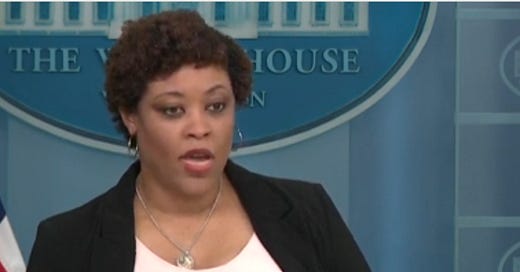Debt-ceiling Deal ‘Protects Key Legislative Accomplishments,’ White House Budget Director Says
Lawmakers must now "make headway" with tax increases, she adds
The often-rancorous negotiations to secure a needed increase in the federal government's debt limit both “protects key legislative accomplishments” enacted by Democrats over the last couple of years, it also proves that bipartisan agreements remain possible.
Those were points made Tuesday by Shalanda Young, the White House budget director and the White House point-person during the debt-ceiling talks.
Young also emphasized that lawmakers must “make headway” in raising some federal taxes.
Young, speaking with reporters during the White House press briefing, talked about the accommodation announced over the weekend which will raise the debt ceiling to allow the government to continue to pay its bills, while enacting some of the spending cuts Speaker Kevin McCarthy and other House Republicans insisted on in order to agree to that debt-limit increase.
Without a debt-ceiling increase, the government soon would have run out of ways to pay its bills, causing a default and triggering a wider economic meltdown.
Legislation to enact the deal between McCarthy and President Biden is set to go to a vote on the House floor Wednesday evening.
“I want to be clear: This agreement represents a compromise, which means no one gets everything that they want, and hard choices had to be made. Negotiations require give-and-take. That’s the responsibility of governing,” Young said. “For months, the president made clear — and you may have heard me say this once or twice — that Congress must take action to prevent default. And from the beginning, he said he would negotiate with Republican leadership on a budget framework, and that will allow the appropriations process to proceed under regular order, just like we do every year.
“The bipartisan budget agreement that we’ve reached protects key legislative accomplishments from the past two years, including the bipartisan infrastructure law, the CHIPS and Science Act, the PACT Act, and the Inflation Reduction Act’s clean energy, corporate minimum tax, and prescription drug provisions,” Young added. “It protects programs millions of hardworking families count on. It protects Social Security, Medicare, Medicaid, the Affordable Care Act, safeguarding health insurance for millions of Americans.”
The agreement would also fully fund veterans’ medical care, including mandatory funding for the PACT Act’s Toxic Exposure Fund at the levels the president proposed in his fiscal year 2024 budget proposal, Young said.
And it would protect critical public health funding from being clawed back to prepare for future pandemics and possible COVID-19 surges, she added.
However, if lawmakers are serious about reducing federal budget deficits and the federal debt, they need make progress on the tax increases on the wealthiest Americans and corporations which the administration supports, Young said.
“We’re not going to give up on our revenue proposals. So while this [bipartisan agreement] will change the trajectory of spending when you see the [Congressional Budget Office] CBO — when we all see the CBO report when it comes out — where we really need to make headway is on our revenue proposals, which has long-lasting deficit reduction abilities and just structural change to change the unfairness in the tax system,” she said.
Republicans have opposed any increase in federal taxes.
Please support our work…
Also, please subscribe…




